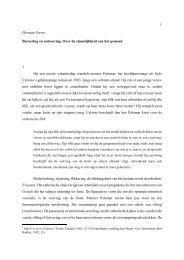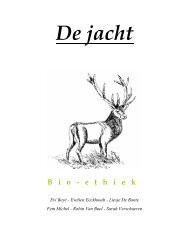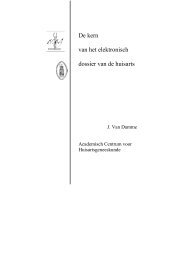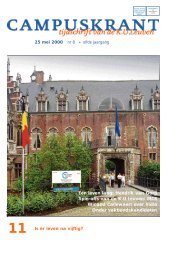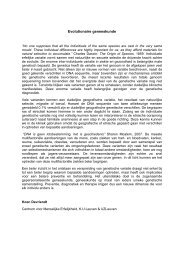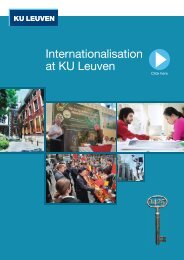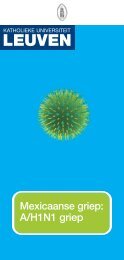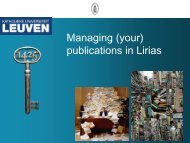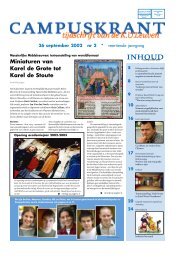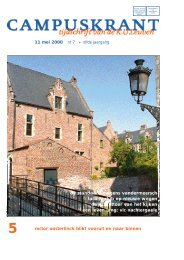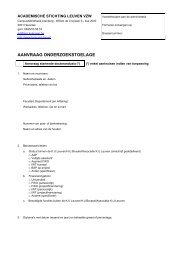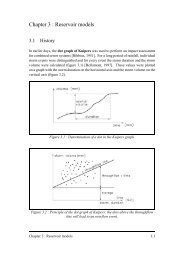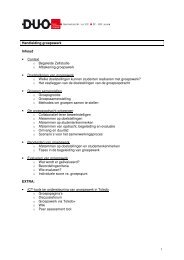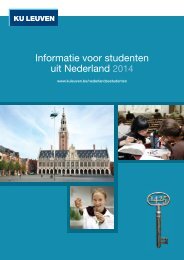EQUALITY GUIdE - KU Leuven
EQUALITY GUIdE - KU Leuven
EQUALITY GUIdE - KU Leuven
You also want an ePaper? Increase the reach of your titles
YUMPU automatically turns print PDFs into web optimized ePapers that Google loves.
Chapter 3 ! Career management 165<br />
4.2.2. Career Management Survey<br />
For this tool: see Tool Annex.<br />
A questionnaire was developed in collaboration with the Mainstreaming Promoters of the<br />
Faculty of Theology (see Good Practice Mainstreaming Promoters: survey career management).<br />
The initial questionnaire was based on the concept note of the Mainstreaming<br />
Promoters and the working group on equal opportunities and diversity of the Faculty of<br />
Theology. Some items (8-12, 18, 20-23, 25, 28, 29, 32, 34) were (partially) taken over<br />
from the questionnaires of the study ‘Doctoreren in Vlaanderen’ 192 . After feedback of the<br />
Mainstreaming Promoters, the working group and a staff member of the Research Coordination<br />
Office and after the authorization of the Faculty Board, the survey was ready to<br />
be sent out.<br />
The survey is a quantitative questionnaire with 35 items. Two types of questions can be<br />
distinguished: a first one inquires about a certain situation or experience (the respondent<br />
ticks the right box), a second one probes the opinion of the respondent (the respondent<br />
marks his/her opinion on a scale from 1 to 6).<br />
The questionnaire consists of seven major parts and was sent to 117 respondents who<br />
have attended the last Master year at the faculty since 1998. The seven parts entail:<br />
1. personal data (year of birth, sex, year of graduation, family situation, number of children);<br />
2. information about the last Master year: grade obtained, course chosen, satisfaction,<br />
actions about funding to start doctoral research, motives to enrol in Master year, information<br />
about different sources of funding, starting the doctoral research, motives to<br />
not start a doctoral research;<br />
3. information about the doctoral research: sex promoter, motives to start doctoral research,<br />
choice of subject, opinion about some statements (regarding the faculty, the<br />
doctoral research, the promoter), formal interviews (performance interview, evaluation<br />
interview, effectiveness of those interviews), obtaining the PhD, interest in scientific<br />
career;<br />
4. information about quitting the doctoral research: the phase of the doctoral research,<br />
satisfaction with terms of employment, motives to quit doctoral research;<br />
5. information about the scientific career: job after PhD, added value of a PhD-degree,<br />
expectation to remain scientifically active;<br />
6. information about ending the appointment at the university: way to end career at university,<br />
motives to leave university;<br />
7. information about the current job (career): decisive elements in choice of profession,<br />
satisfaction with terms of employment in current job, current job, level of current job.<br />
In the questionnaire reference functions were used. This means that depending on a<br />
certain answer one is directed to a next one. This is because not all parts are relevant to<br />
everyone. Of all respondents that graduated as a student, some started a doctoral research<br />
and others did not for certain reasons. Some obtained their PhD, some did not.<br />
192 Verlinden, A.; Billiet, J.; Pyck, H.; e.a. (2005), op. cit.



